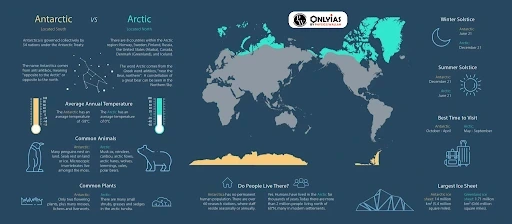|
Tundra Ecosystem: Extreme Conditions, Adaptations, Characteristics, Types |
Tundra Ecosystem: Extreme Conditions and Unique Adaptations
The tundra ecosystem is one of the Earth’s most extreme and challenging environments, characterized by its frigid temperatures, vast stretches of permafrost, and a short growing season. In these areas, the soil remains frozen year-round, and when the summer season arrives, the land covered in snow thaws, creating shallow ponds.
Tundra Ecosystem: Characteristics and Locations
The tundra ecosystem is a biome characterized by its extremely cold climate, low temperatures, and short growing seasons.
- Distribution: It is primarily found in the polar regions, including the Arctic tundra in the Northern Hemisphere and the alpine tundra at high altitudes in mountain ranges.
- Treeless Areas: Tundra ecosystems are almost treeless areas where environmental conditions are very severe.
Tundra Ecosystem: Characteristics
- Harsh Climatic (cold and windy): The average temperature is -30 to 20 degrees Fahrenheit (-34 to -6 degrees Celsius) in Arctic tundra.
- Species Found: Animal species that may be found in the Arctic include polar bears, caribou, arctic foxes, gray wolves, snow geese, and musk oxen.
- Short Summers: The summer growing season is just 50 to 60 days, when the sun shines up to 24 hours a day.
- Precipitation: Scanty rainfall, precipitation is mainly in the form of snow.
- Soil: Permafrost, or soil that is perpetually frozen, is deficient in nutrients.
- It is a layer of frozen soil and dead plants that extends some 1,476 feet (450 meters) below the surface.
- A large portion of the Arctic is permanently frozen.
- Low Biotic Diversity: Due to its extremely low temperatures, little precipitation, poor nutrients, tundra regions support very less number of species.

Types of Tundra Ecosystems: Arctic, Alpine, and Antarctic
- Majorly Arctic & Alpine exist but Antarctic Tundra is also present in limited areas:
| Arctic | Alpine | Antarctic |
|
|
|
|
|
Example: Antarctica Tundra |
|
|
|
|
|
|
Significance of Tundra Ecosystem: Insights into Climate Change, Biodiversity, and Global Cooperation
- Unique Environment: Antarctica’s tundra provides a unique and relatively pristine environment for scientific research, offering insights into climate change, glaciology, and biodiversity.
- Climate Change Research: Antarctica serves as a critical barometer for measuring global climate change due to its sensitivity to temperature variations.
- Ice Sheet Studies: Antarctica’s massive ice sheets are integral to the study of ice dynamics, sea level rise, and potential impacts on global climate.
- Environmental Protection: The region plays a pivotal role in global conservation efforts, with treaties and agreements in place to safeguard its unique ecosystem.
- International Significance: Antarctica is a zone of international cooperation, fostering peaceful collaboration among nations, and it’s demilitarized under the Antarctic Treaty.
- Educational Value: Antarctica offers unique opportunities for educational institutions, fostering an interest in science, climate, and environmental stewardship.
Winterkill Phenomenon
|
Tundra Ecosystem: Vital Role in Climate Regulation and Unique Biodiversity
The tundra ecosystem may appear barren at first glance, but it plays a critical role in global climate regulation and provides vital habitat for unique species.

 GS Foundation
GS Foundation Optional Course
Optional Course Combo Courses
Combo Courses Degree Program
Degree Program









